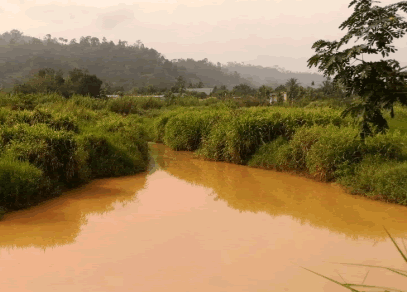Ghana, Cote d’Ivoire work to solve pollution of Tano and Bia rivers
 Authorities in Ghana are in talks with their Ivorian counterparts over measures to sanitise the two major water bodies, the Tano and Bia Rivers, which have been polluted by the activities of Ghanaian illegal miners.
Authorities in Ghana are in talks with their Ivorian counterparts over measures to sanitise the two major water bodies, the Tano and Bia Rivers, which have been polluted by the activities of Ghanaian illegal miners.
“The Ministries involved – Environment and Mines of both sides have met on three occasions; once in Abidjan and then twice in Ghana.
“We have drafted an MOU and have outlined all the steps that we are going to take to sanitise the water bodies,” Professor Kwabena Frimpong-Boateng, Minister of Environment, Science, Technology and Innovation, announced in Accra.
He was answering a question posed by the GNA about what Ghana was doing to address the water pollution fracas that had popped up between Ghana and Cote d’Ivoire.
The Minister gave the response at a meeting in Accra, involving a delegation of the United Nations Industrial Development Organisation (UNIDO), and other stakeholders to discuss how to reduce mercury usage in artisanal mining.
The meeting, also attended by members of the Inter-Ministerial Committee on Illegal Mining (IMCIM), representatives of Small-Scale miners and other stakeholders, also briefed participants on a UNIDO collaborative project aimed at supporting Ghana to gradually eliminate mercury usage in the country.
The Tano takes its source from the forest in Pooyemin, near Techiman, and flows 400 kilometres from Techiman to Ehy Lagoon, Tendo Lagoon and finally Aby Lagoon in Ivory Coast, from where it enters the Atlantic Ocean.
The Tano River System has a total catchment area of about 15,000 Km2 shared between Ghana and Cote D’Ivoire. About 93 per cent of the drainage area is within Ghana, whilst the remaining 7 per cent is in the Cote D’Ivoire.
The Bia also flows through Ivory Coast and empties into the Aby Lagoon.
Giving more information on the issue, Prof Frimpong-Boateng explained that the Ivorians got their water supply from the Bia and Tano rivers and that the polluted Tano was also polluting the Abidjan lagoon, which had become a big problem for the people.
“So we have taken steps that include the deployment of 400 security personnel to deal with this water pollution. And the good thing is that the artisanal miners themselves have also formed a taskforce and they are very helpful because those doing the right things don’t pollute the waters,” he explained.
“This is because they have the impression that the polluters of the waters have brought this calamity of the ban on mining on them. So they are helping us in addressing the issues.
“As we go on the situation will improve. It will take some time but the Ivorians know that we, in Ghana, are doing something about it.”
He also sounded a caution to those illegal miners who were still engaging in the illegal mining activities in the Atewa range and other mining centres, despite the ban, that they would be dealt with soon.
He said the Ivorian authorities started complaining about the pollution of their water bodies by the activities of galamsey operations in Ghana which had polluted two of major rivers in their country long time ago.
“And so I believe that things are going to be better, we’ve had a big problem on our hands with the artisanal gold mining, and illegal mining and we want to take advantage of this unfortunate situation to create something that is better for our nation and especially for the miners,” Prof Frimpong-Boateng stated.
The Technical Experts Sub-committee set up by Ghana and Côte d’Ivoire to come up with measures to tackle the pollution of the Tano-Bia River Basin and its impact on Côte d’Ivoire in June this year presented its first report to a ministerial ad hoc committee in Accra.
The report, among others, recommended that both countries had to adopt a programme of activities to deal with illegal mining in the Tano-Bia basins shared by both countries, with clear timelines.
In March 2017 an Ivorian newspaper article, titled ‘The ‘Gold Rush’ polluting Cote d’Ivoire’s drinking water,’ reported how galamsey in Ghana was impacting on water supply in that country.
The report described the Bia River as a vital source of water for the residents of Bianouan in eastern Cote d’Ivoire.
“They drink the river water, and they bathe, fish and wash their clothes in it. But all that changed about a month ago, when the river turned a murky brown. Our observers suspect that illegal gold mining is behind the contamination,”
It said the people in Bianouan could no longer use the river for drinking or washing, because it is so polluted, and fishing had come to a standstill.
Source: GNA
